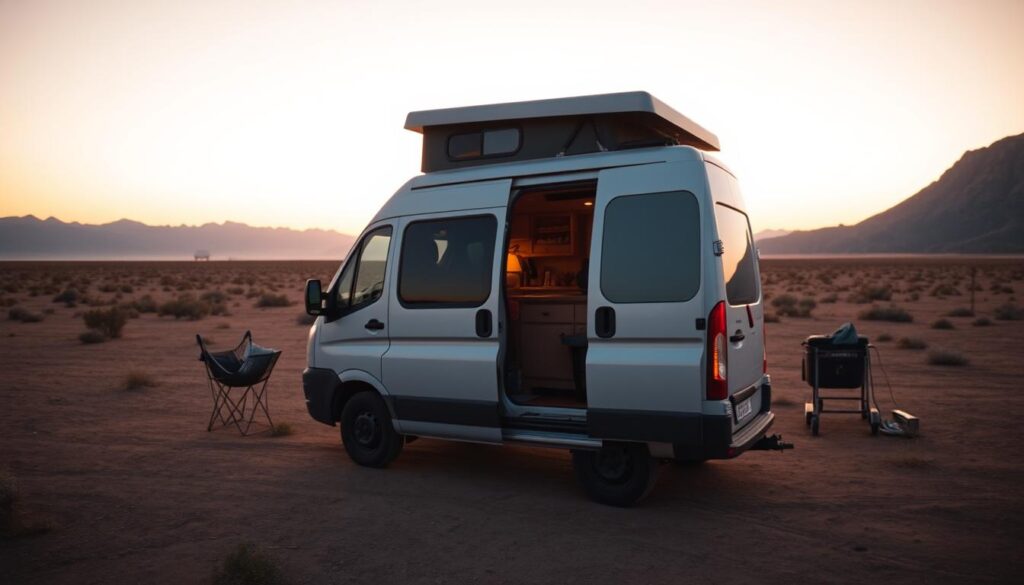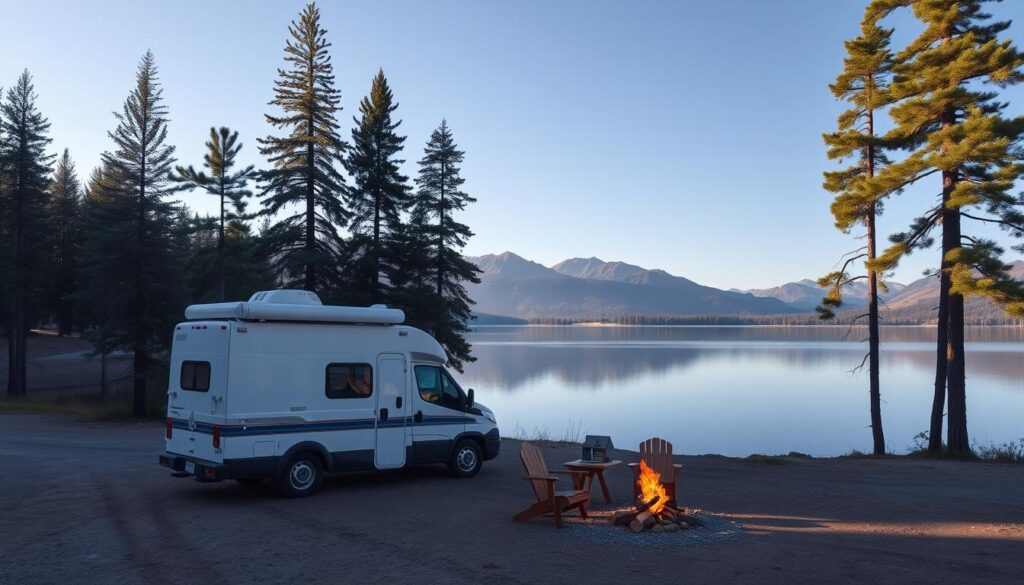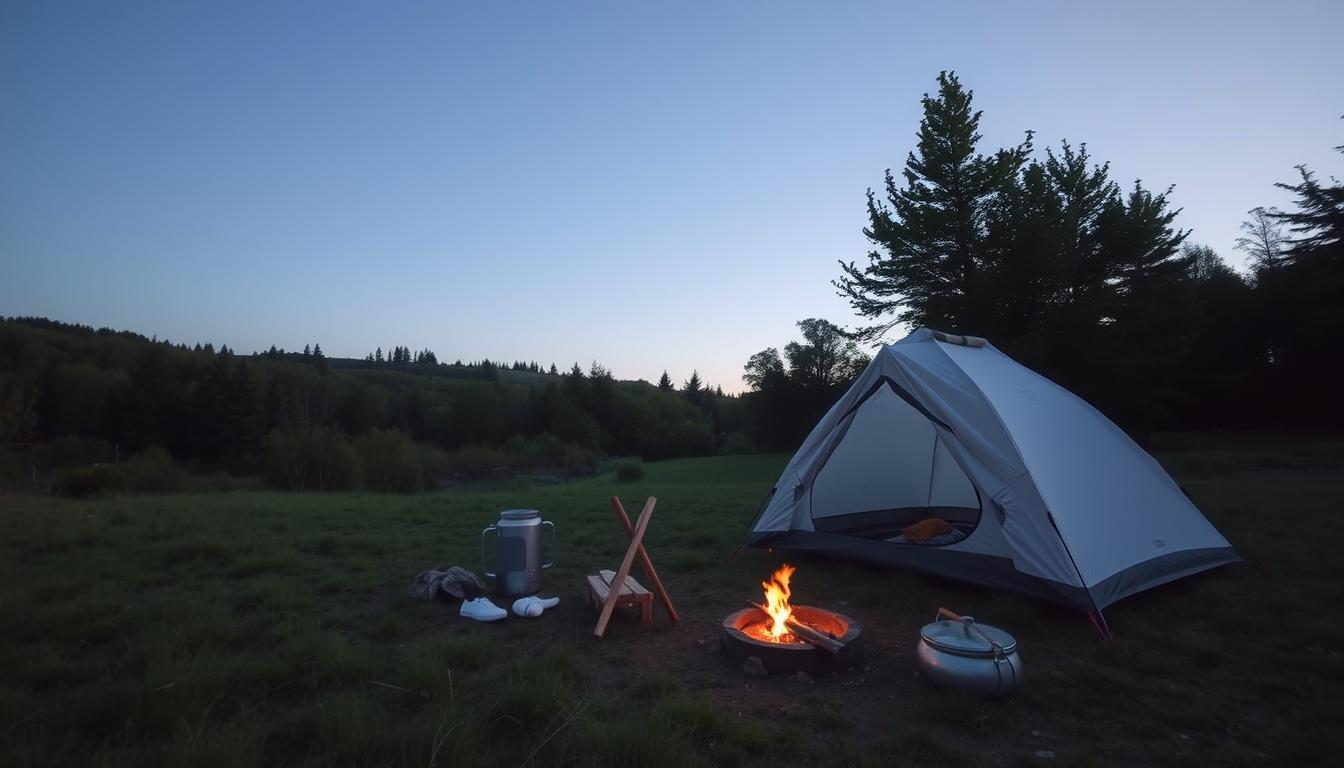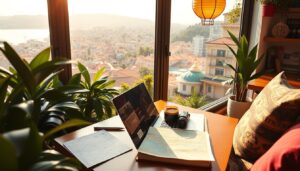Our lives are getting cluttered with stuff, making a minimalist lifestyle more appealing. It’s a way to fight against too much stuff and find freedom. Living on the road is a great way to see the value of embracing minimalism.
When we travel, we learn what’s really important. We see the difference between what we need and what we want. A minimalistic lifestyle is about finding what truly adds value to our lives.
Traveling teaches us to value experiences and people more than things. It shows us that true richness comes from living, growing, and connecting with others. This journey helps us see that life’s true wealth is in our experiences, relationships, and personal growth.
Key Takeaways
- Recognize the growing appeal of a minimalist lifestyle in response to a materialistically cluttered society.
- Understand how life on the road serves as an ideal teacher for embracing minimalism and the art of living with less.
- Discover that minimalism is a personal journey toward discriminating necessity from luxury.
- Grasp how reduced possessions can lead to a greater emphasis on life’s true enrichments: experiences, relationships, and personal growth.
- Prepare for an in-depth exploration of how a minimalistic lifestyle can be practically and psychologically beneficial.
The Minimalist Mindset: Cultivating a Life of Less
Living minimally is more than just cleaning up your space. It’s about focusing on what’s truly important. This way of living brings personal joy and supports a sustainable lifestyle. It offers many benefits.
Understanding the Principles Behind Minimalist Living
Joshua Becker, a well-known minimalist, shares the key principles. It’s about valuing quality over quantity. It’s about finding joy in fewer, but more meaningful, things and experiences.
Adopting a Minimalist Lifestyle for Greater Fulfillment
Studies in Psychology Today show that minimalism can make us happier. It helps us stop chasing after stuff. This leads to stronger connections and a deeper appreciation for life’s simple joys.
Overcoming the Challenges of Minimalist Living
Starting a minimalist life has its hurdles. Downsizing can feel overwhelming at first. But, with dedication and a clear goal, you’ll find a life free from clutter and full of purpose.
| Challenges | Strategies to Overcome |
|---|---|
| Emotional attachment to possessions | Focus on personal growth and memories, not objects |
| Fear of change | Small, manageable steps towards decluttering |
| Social pressure to conform | Emphasize the personal benefits and improved life quality |
Embracing Minimalism: The First Steps to Simplifying Your Life
Starting your journey to minimalism often begins with decluttering. This step not only frees up space but also simplifies your daily life. It makes your life less stressful and more focused.
This process is about recognizing what truly adds value to your life. It’s about letting go of the rest.
Decluttering: A Systematic Approach to Downsizing
Decluttering is more than just getting rid of things. It’s about reclaiming your space and improving your wellbeing. Marie Kondo, in The Life-Changing Magic of Tidying Up, suggests a method to decide what to keep and what to discard. Each item should have a purpose or bring joy.
- Begin with clothes, sorting everything into keep or give away piles based on joy and frequency of use.
- Move to books and paperwork, discarding outdated or irrelevant items, and keeping only what is necessary or brings you happiness.
- Tackle miscellaneous items such as kitchen gadgets, decorations, and electronics, keeping the useful and saying goodbye to the unused.
- Finish with sentimental items, which are often the hardest to sort through. Hold each item and decide if it truly has a place in your downsized, simplified life.
Establishing Your Priorities: What Truly Matters?
Downsizing is not just about physical items; it’s a shift in philosophy. It’s about focusing on what’s truly important. This might mean prioritizing relationships, personal growth, and meaningful pursuits over material possessions.
Here’s how to establish these priorities:
- Mindful reflection: Regularly spend time reflecting on your experiences and decisions to ensure they align with your life’s values and goals.
- Focus on experiences: Invest in experiences rather than things. Travel, learn new skills, or take up hobbies that enrich your life in real, memorable ways.
- Quality over quantity: In every aspect of life, from your wardrobe to your friendships, focus on quality. Fewer, more meaningful possessions and connections can lead to deeper satisfaction and less clutter.
Decluttering and setting clear priorities make simplifying your life less daunting. By embracing minimalism, you choose to live with intention. In this way, less truly becomes more.
Traveling Light: Packing Tips for the Minimalist Traveler
For those who love minimalist traveling, the key is to travel light. This makes moving around easier and reduces stress about carrying stuff. Travel bloggers and airlines share tips to help you pack like a pro.
Minimalist tips for packing mean planning and picking the right items. Choose clothes that can be worn in many ways. Pick gadgets that do lots of things. And use your luggage space wisely to carry only what you need.
Don’t pack things you might not use. These items just take up space. Instead, focus on packing a few high-quality items. This makes your luggage lighter and easier to carry.
- Choose clothes that can be worn in different ways for different times and places.
- Use one gadget that can do many things to avoid carrying extra devices.
- Use travel-size toiletries or buy them when you arrive.
Knowing what to pack is important. But how you pack is even more crucial. Use packing cubes or compression bags to keep things tidy and save space.
| Item | Use | Frequency of Use |
|---|---|---|
| Lightweight jacket | Weather protection, style | Daily |
| Smartphone | Communication, navigation, entertainment | Multiple times a day |
| Travel towel | Personal hygiene | Regularly |
In short, minimalist traveling is all about simplicity. By following these packing tips, you can travel lighter. This makes your trip better by letting you focus and be more flexible.
Minimalist Living: How Life on the Road Teaches You to Live with Less
Minimalist living becomes real for those who travel. Traveling teaches us to own less and live simpler. It’s about focusing on what truly matters.
Learning From Experience: How Travel Sharpens Minimalist Skills
Living minimally isn’t just about having fewer things. It’s about making every item count. For road travelers, each item must do more than one job. This turns into a skill, helping us decide what’s essential.
Sustainability on the Go: The Environmental Benefits of Living with Less
Traveling light makes things easier and greener. Here’s why:
- Less waste is produced
- Using less energy because of lighter bags
- A smaller carbon footprint from buying and throwing away less
Here’s a table showing how minimalist living is better for the planet:
| Aspect | Minimalist Living Impact | Typical Lifestyle Impact |
|---|---|---|
| Waste Generated | 20% less waste per year | Standard waste production |
| Energy Usage | 30% reduction in consumption | Standard energy usage |
| Carbon Footprint | Significantly lower | Higher due to regular purchasing and disposal activities |

Downsizing Your Life: Strategies for Simplifying on the Move
Starting the journey of downsizing your life is both exciting and challenging. The idea of living with less brings a unique freedom, especially for those always on the move. Professional organizers say the secret to downsizing is using minimalist tips and a mindset focused on simplifying life.
- Start by checking your stuff; figure out what you really need and what you can do without.
- Choose items that can do more than one thing to save space.
- Use digital tools and platforms to keep records and memories, not physical items.
| Strategy | Benefits | Challenges |
|---|---|---|
| Digitalize documents and images | Saves physical space and makes things easy to find | It takes time to set up and scan everything |
| Adopt a capsule wardrobe | It makes getting dressed easier and more consistent | You might feel like you have fewer fashion options |
| Downsize living space | It means less cleaning and upkeep | You’ll have to get rid of big furniture and decorations |
Psychologists talk about the emotional side of downsizing your life. Having fewer things not only clears your space but also your mind. It helps you focus more on experiences than on stuff.
Trying to simplify life through downsizing and living with less makes moving around easier. It also makes you feel better overall. Every new place becomes a chance for a fresh start without too much baggage.
Simplicity in Living: The Psychological Benefits of Minimalist Living
Starting a minimalist lifestyle is more than just cleaning up your space. It’s about freeing your mind and heart. The simplicity in living that minimalist living offers can be incredibly freeing. It leads to big psychological benefits. Studies show it boosts mental health by improving mental clarity and lowering stress.

Choosing a minimalist way of life means more than just having fewer things. It’s about finding true happiness in what we have. This way, we learn to value what truly adds to our lives, finding the joy of less.
The Joy of Less: How Less Becomes More
Chasing after more stuff can distract us from what truly makes us happy. A minimalist mindset helps us see that less is indeed more. This change in values can lead to deep discoveries about what truly brings us joy and fulfillment.
Mental Clarity: The Cognitive Perks of a Minimalistic Lifestyle
Cleaning out clutter is a mental task as much as it is physical. With fewer distractions, our minds can focus better. This leads to better productivity and creativity. Experts say that environments with less clutter help us concentrate and improve mental clarity.
| Aspect | Before Minimalism | After Minimalism |
|---|---|---|
| Stress Levels | High | Low |
| Mental Clarity | Clouded | Enhanced |
| Happiness Index | Variable | Increased |
Living with Intention: Building Purpose through Minimalism
Embracing minimalism is more than just cleaning up your space. It’s about improving your daily life. Living with intention means choosing actions that match your values. A minimalist lifestyle helps you align with your core values.
People who live minimally often feel more fulfilled and at peace. This comes from having a clear mind and surroundings. It helps them make choices that support their growth and purpose.
Setting Intentions for Your Travels and Your Life
Setting clear goals is key to living purposefully, whether traveling or staying home. Having clear objectives for your travels can open you up to new experiences and growth.
Lifestyle Changes That Align With Your Values
Choosing to downsize is a big step towards living more intentionally. It means getting rid of things that don’t add value to your life. Downsizing frees you to focus on experiences, not stuff.
Workshops and examples show that minimalism leads to better well-being. It’s not just about cleaning up. It’s a deep commitment to living a life that reflects your values and dreams.
Minimalist Tips: Practical Advice for Living and Traveling Minimally
Minimalism is more than having fewer things. It’s about focusing on what truly adds value to your life. It can change how you live at home and travel.
Start small when you begin minimalist living. Pick one area of your home or travel plans to focus on. Taking small steps can lead to big changes.
“The ability to simplify means to eliminate the unnecessary so that the necessary may speak.” – Hans Hofmann
Here are some ways to live with less and apply minimalism in everyday life and travel:
- Evaluate your possessions: Check what you really use. If you haven’t used something in a year, it’s time to get rid of it.
- Quality over quantity: Choose items that last longer, not cheap ones. This is true for travel gear and home items.
- Digital decluttering: Cleaning up your digital space can be freeing. Get rid of unnecessary emails and files.
- Streamlined wardrobe: Use a capsule wardrobe for everyday and travel. Focus on items that can be mixed and matched.
- Repurpose and reuse: Think about using something you already have before buying new. This is key to minimalist living.
- Conscious consumerism: Make sure every purchase is thoughtful. Think about if you really need it.
Using these tips can make your life simpler and more focused. It’s not about giving up; it’s about making room for what’s important. These strategies work whether you’re at home or on the move, helping you live a lighter, freer life.
Conclusion
As we wrap up our look into minimalist living, it’s clear it’s more than a trend. It’s a journey that makes us rethink what we really need. The stories and insights shared show how it frees us from too much stuff and brings peace.
By simplifying our lives, we’re not just getting rid of things. We’re also clearing our minds. This lets us focus on what truly adds value to our lives.
This journey shows that cutting down on stuff is linked to knowing what’s truly important. Minimalism isn’t for everyone; it’s a personal choice towards living with purpose. It teaches us to see what’s truly important while we travel.
This path leads us to a more content and intentional life. It shows that true wealth is in our experiences and relationships, not in what we own.
We encourage you to think about your own path to minimalism. Each step towards a simpler life can make your life better and more meaningful. Let the journey inspire you to find freedom in having less and joy in living more.
Remember, every step forward is a chance to find the benefits of living simply. It’s a chance to live a life full of experiences and free from too much.




